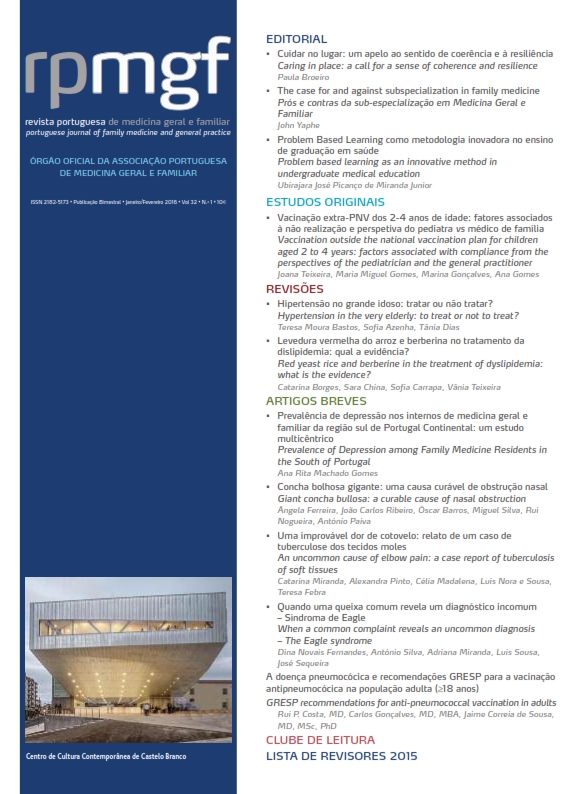Hypertension in the very elderly: to treat or not to treat?
DOI:
https://doi.org/10.32385/rpmgf.v32i1.11687Keywords:
Hypertension/therapy, Aged, 80 and overAbstract
Introduction: Hypertension is the most prevalent cardiovascular risk factor. A decrease in blood pressure (BP) in hypertensive patients below the age of 65 reduces the risk of cardiovascular events and death. There are few studies of the reduction of risk in the very elderly (above 80 years of age). Objectives: To review the evidence for the reduction of risk of major cardiovascular events and mortality in very elderly patients with anti-hypertensive treatment. Data source: National Guideline Clearinghouse, Guideline Finder, Canadian Medical Association, The Cochrane Database, DARE, Bandolier, MEDLINE/PubMed e Índex de Revistas Médicas Portuguesas. Methods: A search was conducted on MEDLINE and evidence-based medical sites for articles published between January 2004 and August 2014 in English, Spanish or Portuguese using the keywords ‘Hypertension/therapy’ AND ‘Aged, 80 and over’. Results: Eight articles met the inclusion criteria. In the guidelines found, antihypertensive treatment reduced the incidence of stroke and cardiovascular morbidity and increased mortality from other causes (Strength of Recommendation C). For patients in good physical and psychological condition, BP values should be around 140-150mmHg (Strength of Recommendation B). Otherwise, treatment should be individualized and monitored clinically (Strength of Recommendation C). One meta-analysis found a reduction in the risk of stroke, cardiovascular events and heart failure (LE 2). Clinical trials show benefit in controlling BP to 150/80mmHg (LE 1). Lower values are associated with greater risk of death and heart failure (LE 2). Conclusion: The overall benefit of treatment of elevated blood pressure in very elderly is questionable. Although it is associated with a reduction in the risk of cardiovascular events, all-cause mortality, and cause-specific mortality, the results are mixed (Strength of Recommendation B). The reduction of all-cause mortality was achieved in studies with lower reductions of blood pressure and less intensive therapies (Strength of Recommendation B).Downloads
Downloads
Published
Issue
Section
License
The authors will assign to the RPMGF the sole right to publish and distribute the content of the manuscript specified in this declaration via physical, electronic, broadcasting or any other medium that may come into existence. They also grant the RPMGF the right to use and exploit this manuscript, in particular by assigning, selling or licensing its content. This permission is permanent and takes effect from the moment the manuscript is submitted, has the maximum duration allowed by applicable Portuguese or international law and is of worldwide scope. The authors further declare that this assignment is made free of charge. If the RPMGF informs the authors that it is not going to publish their manuscript, the exclusive assignment of rights ceases forthwith.
The authors authorise the RPMGF (or any entity it may appoint) to act on their behalf when it believes that copyright may have been infringed.





